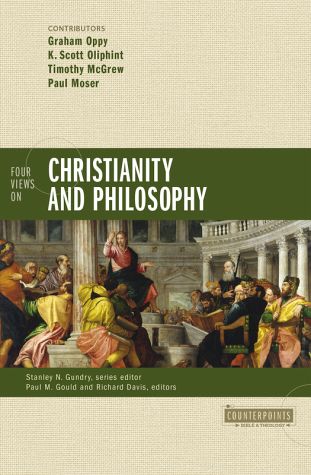Podcast: Play in new window | Download
Subscribe: Spotify | Email | RSS

We find miracle-reports in many religions. Does this undermine Christian appeals to miracle-reports? In this interview about his interactions in the new book Four Views on Christianity and Philosophy (kindle), Dr. Timothy McGrew discusses this and other issues, including:
- his religious background and his journey into Philosophy of Science
- whether or not metaphysical naturalism is superior to theism in virue of its greater simplicity
- Dr. Graham Oppy’s claim in this book about the alleged resurrection of Jesus that “All the evidence we have is the contents of a modest number of documents of uncertain pedigree.”
- whether or not Paul in Romans 1 gives any support to the project of natural theology, in light of two earlier famous scriptural passages
- arguments for the basic reliability of the New Testament writings based on observable relationships between their contents
Links for this episode:
- Four Views on Christianity and Philosophy (kindle)
- Dr. Timothy McGrew’s home page
- David Hume, Miracles (pp. 55ff)
- John Douglas, The Criterion
- William Adams, An Essay in Answer to Mr. Hume’s Essay on Miracles
- George Campbell, Dissertation on Miracles
- Psalms 19; Wisdom of Solomon 13; Romans 1:18-25.
- podcast 161 – Dr. Paul Moser on Conforming Philosophy to Christianity
- podcast 160 – Dr. Graham Oppy on the Conflict between Christianity and Philosophy
- definition of the verb “to pettifog”
- This week’s thinking music is “Monkeybars“ by Andy G. Cohen. Released under a Creative Commons Attribution International License. https://andyg.co/hen/songs/monkey
Related posts:
How Trinity theories conflict with the New Testament
2015: the trinities podcast in review
podcast 357 - Seminary student takes Trinity class, becomes unitarian - Part 2
podcast 227 - Who Should Christians Worship?
Do the Gospels disagree about Jesus and God? Part 2 – Counting the Costs
podcast 132 – 10 Apologists’ Mistakes about the Trinity – Part 2
Important new open access journal: The Journal of Analytic Theology
It's just gotta be true...
new exchange with Bill Hasker in EJPR
a quote every theology student working on the Trinity or Incarnation should memorize



This is a great exchange. I could listen to you and Tim McGrew all day.
At this point I’m only maybe two-thirds of the way through, but I wanted to offer another view on miracle, one that does not tie the concept to the idea of a supernatural being providing the direct cause for an event.
In my book “The Swedish Atheist, the Scuba Diver, and Other Apologetic Rabbit Trails,” I argue that an event could be a miracle even though it is predicted by known laws of nature. Here are some relevant excerpts:
“Let’s say for the sake of argument that the current view that weather systems are inherently unpredictable is shown to be false. As a result it becomes possible to predict future weather events with certainty up to one day in advance. Let’s imagine further that these one day forecasts become so accurate that they can predict with certainty not only that it will rain, but even the future trajectory of every rain drop, snowflake or hail pellet up to a full day in advance. Finally, let’s imagine that weather.com offers custom forecasts of tomorrow’s weather for your city, neighborhood, or even your own backyard. All you need to do is go to their website and type in the coordinates of your house and you’ll receive a completely accurate backyard forecast for the following day.
“One day you get the forecast for your backyard because you’re planning an outdoor birthday party….”
“So a second later the forecast pops up and it states that a violent thunderstorm will drop marble-sized hail pellets on your yard. Then the forecast shows you where all the hail will land and, incredibly, it predicts that the pellets will spell out ‘Happy Birthday’ on your back lawn.”
… “Sure enough, the following day everything happens just as predicted. Your guests amass underneath a big tent when the storm blows in and delivers an icy well-wish from above. Even though this event was predicted in advance in accord with known scientific laws, I have no problem saying that it’s a [miracle], given the meaningfulness of its signature. In fact, I think that would be a great example of God working within the laws of nature. This kind of action is surely something well within the ability of an omnipotent being.”
“… an event which is predicted in advance in accord with known scientific laws could carry a sufficiently suggestive signature that it’s reasonable to conclude it was directed by an intelligence.”
Great discussion.
I enjoyed McGrew’s explanation of how we should look at “evidence” when it comes to dealing with historical information.
Pingback: Dr. Timothy McGrew Interviewed on Trinities Podcast | The Library of Historical Apologetics
Comments are closed.